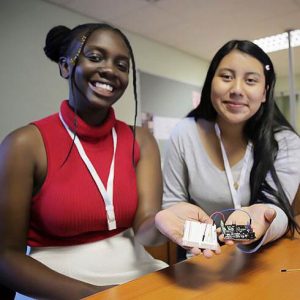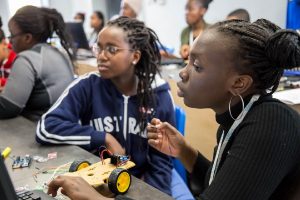-
What We Do
- WHERE WE WORK
-
About Us
 Welcome Message from Carol Jenkins
Welcome Message from Carol JenkinsFor more than 90 years, World Learning has equipped individuals and institutions to address the world’s most pressing problems. We believe that, working together with our partners, we can change this world for the better.
On my travels, I’ve had the opportunity to meet with many of those who have joined us in this mission. In Baghdad, we’ve trained more than 2,300 Iraqi youth who are already giving back at home. In London, our partners in the TAAP Initiative strongly believe that we are all responsible to practice inclusion. And in Vermont, our Experiment in International Living and School for International Training participants prove every day that they have the tools and the determination to change the world.
Please join us in our pursuit of a more peaceful and just world.
- Get Involved
Media Center > Story
This Teen Is Advocating for Girls’ Education in Kenya
August 24, 2018
Fifteen-year-old Natalie Obiero believes girls everywhere have the right to go to school. As an excellent student herself — who spent this summer learning about science and technology at WiSci, the Women in Science Girls STEAM (Science, Technology, Engineering, Art & Design, and Mathematics) Camp — she’s working hard to ensure these opportunities are available to all girls in her hometown of Nairobi, Kenya.
In December 2016, Obiero teamed up with her mother to found Blossoming Flowers, an organization that mentors girls and provides them with emotional and psychological support. Blossoming Flowers also provides girls with sanitary napkins so that they can continue to attend school during their menstrual cycles. (Lack of access to sanitary napkins is often cited as a reason girls drop out of school.) And most importantly, Obiero says, “We teach them that we are equal with the men in our society.”
It started with an offhanded comment at a family gathering.
Obiero had been sitting outside with some of her family members when her uncle turned to her father. “Why isn’t Natalie inside cooking with her mother?” he asked. Natalie was livid. She stormed up to her room and decided then and there to fight sexist attitudes.
“I told myself that no other girl should be hearing such comments, especially not from a man in her family,” Obiero says. “So, I immediately thought of helping other girls to realize that such comments should not be taken lightly.”
Blossoming Flowers works closely with a local orphanage where Obiero and her mother — who works for the United Nations Development Programme — play and bond with the girls.
Obiero says their young organization has received mostly positive feedback, though she has had some challenges. “There have been some slight remarks from men who ask me questions like, ‘How can you empower girls if you’ve experienced nothing in your life?’” Obiero says. “I say I have enough to share what I have.”

She has even more to share after spending two weeks at this summer’s WiSci STEAM Camp in Windhoek, Namibia.
Administered by World Learning, the WiSci STEAM Camp is a public-private partnership between the U.S. Department of State’s Secretary’s Office of Global Partnerships, UN Foundation’s Girl Up Initiative, Intel Corporation, and Google. In July, the camp brought together nearly 100 girls from the United States and sub-Saharan Africa to explore STEAM subjects through hands-on workshops with Intel, Google, and NASA.
Obiero has been interested in science and technology since she was six. She was inspired by her working mother, who defied cultural expectations that women should stay home to cook and clean. “I always told myself I wanted to be an engineer or a forensic detective,” Obiero says. On the advice of a teacher, she applied for WiSci to meet other girls who were as interested in science and technology as she was.

“As I mentioned, girls in my country don’t get to go to school so being able to come here on such a program has been such a privilege to me,” Obiero says.
The camp also reinforced Obiero’s commitment to girls’ education. Not only were many of the courses taught by women in STEAM fields, who served as mentors to the younger girls, but the camp also offered daily classes on leadership and public speaking. Obiero was particularly excited to sharpen those skills. “As an advocate of women’s rights, I need to be a strong leader and a good public speaker,” she says.
Obiero plans to continue her work with Blossoming Flowers upon her return to Nairobi. “There are challenges I face,” she says. “But the upside is bringing smiles to the girls’ faces and watching them grow up and see success.”
Women in Science (WiSci) Girls STEAM (Science, Technology, Engineering, Art & Design, and Mathematics) Camp is a private public partnership (PPP) between the U.S. Department of State’s Secretary’s Office of Global Partnerships, UN Foundation’s Girl Up Initiative, Intel Corporation, and Google. In 2018, the camp brought approximately 100 high school girls from the African continent and the U.S. together for 13 days in Namibia to explore the STEAM fields and access mentorship opportunities and leadership training.





